
Hari Hari,
In the last ten days, Satsvarupa Maharaja has been hospitalized twice for stress-related issues, urinary-tract issues, and dehydration issues. The first occurrence happened before the July 5 book festival, with Maharaja visiting the emergency room for twelve hours. All tests were deemed negative, and he was sent back home. The bookfest seemed to go very well, and Satsvarupa Maharaja attended for more than three hours before returning to a friendly lunch with an old friend, Jayadvaita Swami, at Viraha Bhavan. However, two days later the same issues flared back up, and Satsvarupa Maharaja faced another twelve hours of being closely monitored in the ER, this time in Albany’ St. Peter’s Hospital. He then caught a break the next day when an appointment fortunately opened up with his urologist. Currently he is at home but weak, among other things nursing a bad cold. He is strong enough to honor lunch with the devotees downstairs, but other parts of his daily bhajana will just have to wait.
Baladeva
If you would like to help, please contact Kṛṣṇa-bhajana dāsa at [email protected] or [email protected] and we will find you a service that utilizes your talents.
Bhaktivinoda Thakura defines nama-rasa as “the topmost spiritual science of the mellows of the holy name.”…Chanting is not an impersonal meditation. It culminates in development of personal loving service for Radha and Krsna. As Srila Prabhupada used to say, by chanting “you can come to know Krsna face to face.”
******
The science of rasa is discussed throughout the Nectar of Devotion, but rasa is a particular mellow in which a pure devotee renders eternal devotional service to Lord Krsna in Goloka Vrndavana. There are five primary rasas, but the followers of Lord Caitanya conclude that madhurya-rasa (conjugal love) is the chief goal. Since hari-nama is the yuga-dharma for Kali-yuga, it stands to reason that conditioned souls (nitya-baddha) can gain release from bondage and develop love of God simply by chanting the Hare Krsna mantra. BhaktivinodaThakura writes, “ . . . This rasa, by the grace of Krsna, is propagated in the material world in the form of His holy name.”
******
Bhaktivinoda Thakura describes elevation by the Hare Krsna maha-mantra, beginning from sraddha and progressing up to prema. “By the grace of the spiritual master, he is initiated into the chanting of the Hare Krsna maha-mantra—the holy names of the Divine Couple.” It is significant that Bhaktivinoda Thakura declares the maha-mantra to be actually a calling out of the names of Radha and Krsna.
Previous acaryas such as Raghunatha dasa Gosvami and Jiva Gosvami have given confidential explanations of the maha-mantra, revealing that the holy names refer exclusively to Radha and Krsna in Their conjugal pastimes.
******
Bhaktivinoda Thakura has also written a prayer explaining the maha-mantra, which includes lines like these:
O Hara (Radha)! Please reveal to me Your most cherished pastimes with Your beloved Sri Krsna.
O Rama! Please reveal to me Your most cherished pastimes with Your beloved Sri Radha.
O Rama! Please engage me in remembering Your transcendental name, form, qualities, pastimes, etc.
O Rama! Please make me fit to serve You while remembering Your transcendental name, form, qualities, pastimes, etc.
******
“The introspective devotee must at first discard all the ten offenses and simply meditate on the holy name, trying to chant constantly. He should distinctly pronounce the holy name and meditate upon the transcendental sound vibration. When his chanting is clear, steady and blissful, he should try to meditate on the Syamasundara form of the Lord. With chanting beads in hand, his chanting and meditation should seek out the transcendental form of the holy name. He will indeed see with spiritual vision the real meaning the name represents.
“Another method he may employ to see this form is to sit in front of the Deities, drink the beautiful form of the Lord with his eyes and meditate upon the holy name. Even after reaching the stage where the holy name and the form of the Lord become one, he must try to remember the transcendental qualities of Lord Krsna. The holy name and qualities of Krsna must merge through constant chanting” (HNC, p. 105).
******
What am I doing to connect my chanting with the rasika pastimes? I am simply reading about Radha and Krsna in Vrndavana. Their pastimes, as given in the rasa-sastras, are so potent that they may rub off on me and gradually become part of my “normal” thinking. I cannot artificially impress these pastimes into my japa, but I pray that they may kindly appear. And thus I am begging for the nectar of the holy names as I chant.
******
Nama-rasa develops further into realization of one’s own eternal rasa with Radha and Krsna and continual meditation on service to Them in the daily Vraja pastimes. A serious practitioner of harer nama may consult the authorized books of Bhaktivinoda Thakura, Visvanatha Cakravarti, and other authorities to learn about it. These topics … are revealed in the heart of a sincere devotee who wholeheartedly follows the order of his spiritual master to chant the Hare Krsna mantra and to render devotional service free of aparadhas and anarthas.
******
My main practice during these twenty-one days and for a long time after will be to return the mind from its errant wanderings and fix it on the sound of the holy names. I do this because I have faith in the order of my spiritual master. Srila Prabhupada said that everything would come by attentive chanting, so I am striving to become attentive. But I cannot personally relate through my diary of experience the nama-rasa, the nature of entrance into krsna-lila in svarapa-siddha, or any of these stages. I can only tell something of the struggles and rewards of the fallen jiva who has become fortunate enough to meet a pure devotee of the holy name. I cannot tell a higher truth than I know (except theoretically), but neither can I remain silent.
pp. 19-25
Dear Lord Krsna, You have delivered me from all dangers. You were always with me, but I didn’t know it then. Now I pledge to be Your servant and a disciple of His Divine Grace A. C. Bhaktivedanta Swami Prabhupada.
Little guy says “I won’t abuse the freedom you gave. I’ll always treasure it.” Be kind to me, and poets like me, he pleads, but it’s he who should take the ball and run. Oh, score a touchdown for Krsna’s side. A dead man cannot preach.
If I could change the world.
You can. By changing yourself. By prayer. By reading Prabhupada’s books and chanting the Hare Krsna mantra.
You gotta lot of work to do,
to get a message through
and get back into this material world.
Oops, I mean out of this material world. George, you and I prefer the spiritual over the material.
A man in Hungary wrote me a letter in a paternal way, “Dear spirit soul, be happy you can chant Hare Krsna. Since you are servant, you are doing very nicely. Please continue to travel and preach, making auspicious breaks and writing books . . . E. V. Gney.” Did he detect I was groping for encouragement?
Well, everybody needs love.
My writing is about giving and receiving love within Krsna consciousness. I write because the lunch room at Tottenville High School contained no love, even while a small carton of milk cost only five cents and after you had gulped it down with your sandwiches amid the kids your own level, you went back in line and bought eight cents worth of frozen ice cream, malted, with chocolate chips.
Now it’s raining.
Poor creatures. I don’t mean me, but the lambs and sheep on the hill just behind me. As I write, the silence is broken by “baa-aa-aah, baa-aa-aah.” Is it their nature to cry, or are they suffering? There’s plenty of grass, but still they cry. Do they know they are being kept for slaughter? How could they?
The dumb sheep baa-aa-aah, but Jean is not worried, he says. Made an excuse why not to be a vegetarian. Never met a guru, baa-aa-aah—sing in Harvard groups scholars drunk, “We are poor little lambs who have gone astray…
we are little black sheep .. .
God have mercy on such as we,
Baa-baa-baa.”
I deplore the human condition when it falls to these low-down dregs. They laughed when I chose a salty word to describe the pit people descend to, the cruel, nasty, hedonistic, atheistic thing people call life. This world is a butcher shop, where even the Church supports animal slaughter. After all, the sheep have no soul and the government needs the money. “We’ve got more important things to worry about than dead sheep,” I heard someone say. Throw him in a hole.
Imagine a graduation ceremony, scholars and graduates, with sheep wearing academic robes and mortar board hats with tassels. The long-horned ram gives a speech and is applauded with baa-baa-baa, but before they can go home…
You know how it ends.
In the human gathering we can chant Hare Krsna.
Preach, you better reach
them because there’s no other way to go.
It’s like a Kipling sonnet for
a march into the desert or the
charge of the Light Brigade.
Preach by distributing books
and be happy
a brahmacari who’s
allowed to write a poem
who may never come home
’cause he drowned in
Lord Caitanya’s nectar, given
to those who do His bidding.
Hey, preach! It’s the best way
to reach. Distribute books
that’s the answer to all blues.
If you can’t go out
yourself,
give money and
praise those who do go out. Or
else who do you think you are
and how can you say you’ve
preached, you’ve reached? On judgment day you’d better have an answer when He asks why you didn’t
distribute more books.
So goes the song. I know it well.
I may hear it in hell.
(I doubt it ’cause they honor the
division of labor and the brahmanas
may preach differently than the ksatriyas.)
It’s allowed, although
books are the basis
and we all hope to serve the cause
and reach for souls who need
real care,
real example.
Please accept me and all I know to say
as the Rudyard Kiplings of this world
roll on with their song.
I mean no harm. I’m just trying to live
without being crushed
by the steamroller.
pp. 33-40
Reading of the gopis‘ talks to Uddhava on his visit to Vrndavana. Srimati Radharani sees a honey bee and imagines it is a messenger from Krsna. She speaks Her heart out in “crazy” talks, expressing all the symptoms of the topmost lover of Krsna. She criticizes Krsna’s cheating behavior toward the gopis and criticizes His messenger, the bee. Radha criticizes Krsna’s behavior in His former incarnations as Rama and Vamanadeva. She says it is better that the gopis not even speak of or think about Krsna. “But here is the difficulty: in spite of His being so cruel and hard-hearted, it is very difficult for us to give up talking about Him.”
I wrote this in my reading notes: “This is a way that Radha pleases Krsna. It is not born of even a trace of displeasure toward Krsna or a desire to hurt or reject Him, just as He has no tinge of negative feeling toward Her. I can only read it with awareness that this purity and intensity of krsna-prema between Them is inconceivable to me. Someday (in future lives) I may come to understand it because it is the fruit of all devotional activities I may perform and the result of Krsna’s mercy.”
Another section from Heart of Darkness that remains with me from my reading thirty-four years ago is Marlowe’s description of how he felt when the natives were howling and dancing in the jungle while he passed through on his steamboat. He says that although he is repelled by it, something in him is also drawn toward it. He says it’s difficult to describe and yet he does a fascinating job describing it:
They howled and leaped, and spun, and made horrid faces; but what thrilled you was just the thought of their humanity—like yours—the thought of your remote kinship with this wild and passionate uproar. Ugly. Yes, it was ugly enough; but if you were man enough you would admit to yourself that there was in you just the faintest trace of a response to the terrible frankness of that noise, a dim suspicion of there being a meaning in it which you—you so remote from the night of first ages—could comprehend.
These feelings of the steamboat captain Marlowe are also symbolic; Conrad plants them in his story. He is trying to say something about civilized people and their acts of humanity and kindness toward one another, their civility, and so on. He is also trying to say that we too could go the way of the naked, howling savage. We have our own primal screams, and we could easily give vent to all kinds of bestial drives, including manslaughter, cannibalism, etc.
What is it that restrains us from acting like the savages when we hear their drums and howling and spy their dancing on the jungle shore? Marlowe tells us:
He must meet that truth with his own true stuff—with his own inborn strength. Principles won’t do. Acquisitions, clothes, pretty rags—rags that would fly off at the first good shake. No; you want a deliberate belief. An appeal to me in this fiendish row—is there? Very well; I hear; I admit, but I have a voice, too, and for good or evil mine is the speech that cannot be silenced.
Aside from this “true stuff” that Marlowe finds within himself, he also says that he was simply too busy with the external reality of putting bandages on his leaky pipes and steering to avoid snags in the river, so “there was surface truth enough in these things to save a wiser man.”
He doesn’t mention that his inner nature is to be spirit soul and that this is why he could rise above the aborigine. Conrad explores and advocates the restraint which a human being employs to keep himself from killing his fellow being, but he doesn’t give good enough reason for it. It seems to be an enigma to him, just as it was for Marlowe when he couldn’t figure out why the cannibals didn’t eat the white crewmen.
By contrast, Krsna advocates the higher nature in the Bhagavad-gita, based on the constitutional makeup of the self as pure spirit soul. Arjuna asks Krsna what it is that impels a man, as if by force, to commit sinful acts. Krsna tells him that it’s anger born out of lust, the all-devouring enemy of the world. In another place Krsna says that if he makes his mind his friend, he can resist this lower nature. In the beginning, this is done by following the rules and regulations of Vedic culture. Ultimately, however, it is done when one finds his “true stuff,” his taste for serving Krsna, a taste which is naturally sinless and pure.
“The embodied soul may be restricted from sense enjoyment, though the taste for sense objects remains. But, ceasing such engagements by experiencing a higher taste, he is fixed in consciousness.” (Bg. 2.59)
Remembering Krsna and remembering guru, one does not yield to the lower, animal-like impulses. This is also stated as one of the attainments of yoga:
“Being situated in such a position, one is never shaken, even in the midst of greatest difficulty. This indeed is actual freedom from all miseries arising from material contact.” (Bg. 6.23)
Conrad, however, is indirectly teaching his brand of existentialism: be good and decent, but for no good reason, while we live in a savage world. Don’t be greedy or cruel. Be good even though there is no God and no eternal self. Make up your own goodness. That’s all there is and it is noble.
Could the Krsna conscious version of these themes be turned into fiction? Yes, so I continue to mull over whether it’s a task for me or for someone else. So far, I think it’s for someone else.
pp. 23-26
The house is approximately one-half kilometer south of the Simha-dvara gate. Turning right to Sweta-ganga tank, Sarva-bhauma’s house is on the left.
It seems to be a somewhat hidden place, not indicated in any of the tourist books and neither is it a busy ashram. It is more like a household. The residents seemed friendly and showed us into a small open hall with an enclosed structure at one end. The man indicated a corner and said that this was the spot where Sarvabhauma Bhattacarya discoursed on the Vedanta for seven days and Lord Caitanya defeated him with the Vaisnava siddhanta.
The area is about twelve feet by twenty-four feet, with a black floor. The plaster walls have been painted with many different devotional scenes. One wall in the corner shows Sarvabhauma Bhattacarya, quite a stout figure, with sikha and short beard. He is sitting with his left hand on his hip, his right hand gesturing with fingers downward as he debates. Worshipers fan him with camaras. On the wall facing Sarvabhauma Bhattacarya at an angle is a three-quarter bas-relief of the sadbhuja of Lord Caitanya. Below Lord Caitanya are a table and black wooden sandals. The caretaker said these sandals belonged to Sarvabhauma. Other frescos in the room are fading, such as the ones of two bulls (or cows) butting heads; a four-armed form of Nrsimhadeva; a large painting of Jagannath Deities; a baby Krsna; and near the ceiling, a series of about twenty-five separate scenes of krsna-lila, soon to fade away unless they are repainted.
One would like to question the residents more about some of the intricate points, such as whether this was actually the spot where the Vedanta was spoken, or was it spoken in Jagannath temple, as it appears to say in Caitanya-caritamrta? One would like to ask: Where did Sarvabhauma bring Lord Caitanya when he found Him unconscious in the temple? Where is the place where Lord Caitanya gave the jagannath-prasada to Sarvabhauma early in the morning? Where are the rooms, as they are described in such a detailed way, where Caitanya Mahaprabhu feasted, on the invitation of Sarvabhauma and his wife? And since they have consecrated this spot as the site of the seven-day discussion on the Vedanta, one wants to meditate on that philosophical exchange and the triumph of Lord Caitanya. But the family who lives here does not speak our language, and while we try to meditate, they are speaking of other things. (According to Narada Rsi, their talk was not so friendly. It was the same Puri line, that the Westerners are not allowed in the temple because they are low-class, don’t follow sanatana-dharma, are mlecchas, and so on. There seems to be very little acquaintance with the actual practices of ISKCON devotees or even a theoretical comprehension of the knowledge that even a dog-eater can become transformed into a Vaisnava by the chanting of the holy name.)
I promised myself that I will reread Srila Prabhupada’s purports and the verses in Madhya-lila, Chapter Six. Certainly this spot is special because it is Sarvabhauma Bhattacarya’s house and has the paintings of Sadbhuja and Saravabhauma and because the residents have the sense to commemorate the occasion of the Vedanta explanation by Sri Caitanya Mahaprabhu.
Other items in the hall: a separate bas-relief of Krsna lifting Govardhan Hill; in a niche, half-covered with cloth, a painting of Sarvabhauma, with his hand in a teaching mudra, and his followers—two ladies and ten men with tilak, sikhas, and folded palms—all standing and facing Sarvabhauma in a worshipful pose. There is also a painting of Maharaja Prataparudra standing with folded palms, facing Lord Caitanya, and another of Sarvabhauma, who appears to be worshiping Lord Caitanya.
A young boy of the house took an interest in us and showed us something special: a hidden tunnel which they claim leads in two directions—to the sea and to the Jagannath temple. Supposedly it was used by Lord Caitanya.
Opposite this hall there is a Deity room where there are Radha-Krsna Deities, Radha-Rasikaraja and four other sets that they say were worshiped by Sarvabhauma Bhattacarya. Their worship continues today, and we saw Them with Their winter coverings.
pp. 50-52
ādau śraddhā tataḥ sādhu-
saṅgo ’tha bhajana-kriyā
tato ’nartha-nivṛttiḥ syāt
tato niṣṭhā rucis tataḥ
athāsaktis tato bhāvas
tataḥ premābhyudañcati
sādhakānām ayaṁ premṇaḥ
prādurbhāve bhavet kramaḥ
In the beginning there must be faith. Then one becomes interested in associating with pure devotees. Thereafter one is initiated by the spiritual master and executes the regulative principles under his orders. Thus one is freed from all unwanted habits and becomes firmly fixed in devotional service. Thereafter, one develops taste and attachment. This is the way of sādhana-bhakti, the execution of devotional service according to the regulative principles. Gradually emotions intensify, and finally there is an awakening of love. This is the gradual development of love of Godhead for the devotee interested in Kṛṣṇa consciousness. (Cc. Madhya 23.14-15)
Early this morning,
the wind is racing high in the sky
like cleansing an eye
of a dirty particle.
It shows the winter stars
and a small moon
close above the horizon.
The outer door slams all night
and I wake, anticipating
the voices of surrender.
I am the voice of faithful hearing, I
live as a spark within each heart.
When the philosophy is presented,
somehow I respond.
I want to help the soul rise.
Wayne was a Christian and a yogi;
he first got a book in Dallas.
“I read the Bhagavad-gita
and began chanting. But then
the book merged into my shelf
with other books
by other yogis.
But then I came here
seeking the devotees.
I still have my doubts:
Out of so many philosophies,
how is this one the absolute?”
And as I reply, he hears,
‘though not with sraddha.
Sraddha is the gift of God,
the Supersoul within: firm faith.
Listen, spirit soul,
and believe. This is the
worship you wanted.
Remember? You truly want
to worship God. Now is
the time to surrender, and
here is the message—this
speaker is true. Yes,
out of so many, this speaker is
true. Listen with firm faith.
I simply said, “All religions are true
when their essence is bhakti,
but the Bhagavatam is best;
it throws out all cheating,
teaches only the highest truth;
it is not another sect
but the science of pure love of God.
Here is the most knowledge
and the best practice of bhakti.
Hear it well, and at least
you will never be cheated
by impersonalists.”
Wayne nods assentingly,
but voices mixed within him:
it may be.
He listens, but not with sraddha.
Alas, sraddha in Kali-yuga
is often abused.
He heard the same promise
from a crook,
and on the radio the preacher said
send in your money
and I’ll pray that you get a car.
And the yogi seduced him
into thinking he was God.
Wayne sorted it out:
“He’s trying but there’s more.”
And it has led him to our door,
where he is hearing.
But there must be more,
the next step,
if he is to survive in Krsna consciousness.
Tom laughs spontaneously.
“I was really into sense gratification.
Yet I came to the temple,
somehow I got a taste
from the very beginning—
Krsna’s mercy. I thought,
“This is great
let me give everything up
and live like the devotees.
But after a while
I became unsurrendered.
One day I told Visnu-gada,
“I’m going to sleep today.”
He said, “What about your spiritual master?”
I said, “He’s pure
but I’ve only seen him once or twice
and I don’t care I’m
going to sleep.”
Then I left the ashram.
I looked back at the building
and told myself,
“You’ve walked away
from situations before
and you can leave this one too.”
But after hearing the Gita
I kept thinking
what good is mere enjoyment?
I kept thinking this is not the way
to be happy.
I have to live for the soul,
I have to solve death
I don’t want another birth!
I want Krsna.”
New bhaktas,
if they stay,
can gain
firm faith.
That faith may be little,
but for the Gosvamis
real sraddha
is strong.
When Krsna demands “Surrender!”
and you do it,
only then is sraddha.
Spirit soul,
pray for sraddha
even if you don’t know
the name of God,
call out
“Please help me
please appear
and let me hear
with faith
from Your pure devotee!
When he appears
don’t let me turn away;
on that blessed day
When I get the chance
please let me think
Oh these are the people
I was looking for:
this is the truth.”
(TO BE CONTINUED)
pp. 46-51
Wouldn’t you know it, “god” appears with a small “g” in the dictionary. Godel, Kurt, a U.S. mathematician, gets a capital “G,” and so does Robert Hutchings Goddard and Jean-Luc Godard. They even have Godavari. But because God is such a universal word and because of the dictionary’s attempt to remain neutral and nonsectarian, and because some people don’t accept God as the Supreme Person or even in the singular, they relegate Him to small “g.”
As I said, God is a universal principle. Therefore, the word has a whole list of origins—Middle English, Old English (akin to the German gott, “to call out.”) Icelandic godh, Goth, guth. Also, Sanskrit, havate, “(he) calls upon.”
Definitions: 1. any of various beings conceived of as being supernatural, immortal, and having special powers over lives and affairs of people and the course of nature; deity, esp. a male deity: typically considered objects of worship. 2. an image that is worshiped, idol. 3. a person or thing deified or excessively honored and admired.
Oh, I see that they list “god” with a capital “G” next: “In monotheistic religions, the creator and ruler of the universe, regarded as eternal, infinite, all-powerful, and all-knowing; Supreme Being; Almighty, often used in exclamations [by God! God almighty! My God!]” And God-willing.
This is the typical pigeonholing arrogance that I don’t like about the dictionary. Almost any profession is bound to be arrogant in certain ways and make themselves, by some kind of bureaucratic maneuver or one-upmanship, the judges of everyone else. Even in small ways they manage to do it. Bureaucrats are especially good at it. I should know because I used to work in the welfare department. Although they are underlings themselves, they’re able to delay progress even when bigshots want action simply by saying, “The proper file has to be submitted first.” They stick to the rules.
The dictionary, while claiming to serve the people and to be a caretaker of language, becomes the last word, the controller of language. Here they define God not as the Supreme, but as the deity of those monotheistic peoples. God is a category of being. Those people who fit into that particular categorical, religious definition, when they refer to God, this is what they mean.
Of course, this is also the dictionary’s virtue, I know. It has to present the words clearly. This categorical chopping, slicing, threading, and hair-splitting is important so that we don’t mistake a biff for a boff, a godmother for a godown. My real point is that they have no right to try to define God.
Prabhupada said something similar about the scientists. He said their virtue is that they can fashion useful amenities—tape recorders, etc.—but the problems start when, because of their prowess in one field, they start defining the origin of life and the nature of knowledge and preach their atheistic philosophy. By then they’re so far over their heads that we can no longer appreciate their virtues. The lexicographers are good clerks with their index cards and computers and history of usage, but they can’t talk about God. It’s obvious, too, that they don’t intend to say too much about God. He’s just another word in the dictionary. That’s another aspect of their failure.
There is a big atheist called Ludwig Wittgenstein. He made his most serious attack on religion when he said that there is no such thing as an intelligent, logical discussion about God. It just isn’t possible by definition. He felt he didn’t have to deny God because he assumed that God’s nonexistence was logically obvious.
Thus when we go to the dictionary and find this minuscule description of God, it’s certainly not much of a feast. Even when we look at theistic dictionaries, they define God in a vague way—no name, no attributes other than “supreme,” and no residence other than “heaven,” if they even mention it at all. It’s great that they tell us He is eternal or infinite or all-powerful or all-knowing, but who is He? They don’t really tell us. Therefore, Prabhupada didn’t like the word “God.” It’s almost meaningless. He preferred the Sanskrit word “bhagavan” because it has so much more weight. It means “one who possesses all opulence.” Parasara Muni elaborated on this concept:
aiśvaryasya samagrasya
vīryasya yaśasaḥ śriyaḥ
jñāna-vairāgyayoś caiva
ṣaṇṇāṁ bhaga itīṅganāFull wealth, strength, fame, beauty, knowledge and renunciation—these are the six opulences of the Supreme Personality of Godhead.
—Visnu Purana 6.5.47
It’s a much better definition.
Anyway, I shouldn’t complain. At least the word is in the dictionary. I’ve heard that the Chinese language doesn’t even have a word for “God.” I shouldn’t be ungrateful, then, for what little we are given in English. But I guess we’ll have to write our own dictionaries one day, and in them, glorify Krsna. We won’t want to define Him only by His title; we’ll give His names (or at least some of them: Krsna, O Cheater of the gopis, Brother, Baby, Friend, Master, Beloved, Nanda-kisora), and attributes. Only then will we be satisfied.
pp. 97-101
Never place your trust in an animal with claws, a river, an animal with horns, a man bearing weapons, a woman, or a politician.
Srila Prabhupada quoted this sloka frequently. He discussed only two items from the verse: don’t have faith in women or politicians. Presumably, they are more dangerous than rivers, armed men, or clawed animals. Of the two dangers, Srila Prabhupada gave more attention to the danger of women.
“We should be very vigilant,” Prabhupada said. “Canakya Pandita says, viśvāso naiva kartavyaḥ strīṣu rāja-kuleṣu ca: Never trust a woman and a politician. He was a politician, and his wife was kidnapped. He had very bad experience with these two things, Canakya Pandita. Therefore he gave this injunction….” So Canakya Pandita writes not out of inexperience, he was very experienced. All the slokas of Canakya Pandita are very useful for daily affairs.
Canakya Pandita was such a great politician that the embassy quarter in New Delhi is named Chanakyapuri. Ironically, he tells us never to trust politicians. By this logic, a female politician is not recommended. Srila Prabhupada says, “In Mahabharata, there is not a single instance . . . we had very, very great and qualified women. But were they in charge of the state?”
The safe situation for a woman, according to Manu-samhita, is to remain under the protection of her father as a child, her husband during her youth, and her sons in her old age. This system is meant to protect both women and men, and thus to protect the peace in society. Srila Prabhupada writes, “Women, especially beautiful young women, invoke the dormant lusty desires of the man. Therefore, according to Manu-samhita, every woman should be protected, either by her husband, by her father or by her grown-up sons. Without such protection, a woman will be exploited.”
For a sannyasi, even to hear a woman singing is considered dangerous. Srila Prabhupada writes,
Sannyasa means giving up the company of women, but if a sannyasi hears the voice of a woman and sees her beautiful face, he certainly becomes attracted and is sure to fall down. . . . To see a woman’s face and appreciate her beauty or to hear a woman’s voice and appreciate her singing as very nice is a subtle falldown for a brahmacari or a sannyasi. . . . When a woman’s bodily features are attractive, when her face is beautiful and when her voice is sweet, she is naturally a trap for a man. The sastras advise that when such a woman comes to serve the man, she should be considered to be like a dark well covered by grass. In the fields there are many such wells, and a man who does not know about them drops through the grass and falls down.
The depiction of women from the materialistic viewpoint is given by Kasyapa Muni in the Srimad-Bhagavatam:
A woman’s face is as attractive and beautiful as a blossoming lotus flower during autumn. Her words are very sweet, and they give pleasure to the ear, but if we study a woman’s heart, we can understand it to be extremely sharp, like the blade of a razor. In these circumstances, who can understand the dealings of a woman?
In material life, the politician and woman are considered the epitome of self-interested persons. As soon as Kamsa saw that his self-interest was at risk, he forgot his affection for his sister and immediately became her enemy. “A king, a politician, or a woman cannot be trusted, since they can do anything abominable for their personal interest.”‘
The heavenly society girl, Urvasi, saw that King Pururava had become completely infatuated by her. She advised him, “Be sober and don’t allow the senses to overcome you like foxes. . . . You should know that the heart of a woman is like that of a fox. There is no use making friendship with women.”‘ Considering a man’s attraction to a beautiful woman along with a woman’s sly nature, the, Vedic culture considers the protection of women a priority. Srila Prabhupada said,
To have good population, the women should be very chaste. That is the basic principle of Vedic civilization. And to keep the women chaste, it was the function of the responsible father, or in the absence of the father the olderly brother, to get the girl married. It is compulsory…. But if the woman is not protected very strictly, it is very difficult.
These statements are by nature volatile and controversial. Sometimes when Prabhupada was challenged about his views on women, he said he was innocent. He was simply repeating the words of authority. It’s not that Prabhupada was evading the issue or unwilling to give his own conclusion, but his mood indicates that it is not a matter of personal prejudice. Even though these statements may be hard for us to accept, we have to see that there is truth in this Canakya sloka as Prabhupada used it.
To apply it, however, is difficult enough that it should be wielded only by those with enough experience and wisdom. Verses like this should certainly not be used as a weapon to exploit women or to speak of women in a derogatory way. This verse only refers to the particular susceptibility of women in the materialistic context. The very fact that one says, “Don’t trust women” implies that they become dangerous because of a man’s lusty mentality. When women are exploited, they have to fall back on the feminine weapons of slyness and beauty.
Therefore, we can understand that anyone—whether it be a materialistic woman or politician—who is being forced to fight for survival, should not be trusted.
pp. 26-29
I don’t want this to be a mere exercise racing by the clock. I feel something that I’m reluctant to preach. I’d rather go deep inside myself and know something. Does that sound bad?
You don’t understand (dear reader) what I’m trying to say. I’ve said this before? It sounds familiar? Sounds like when I was in the Pyrenees trying to decide whether to live in a house in remote Ireland for prayer? No it’s not like that. “Prayer” isn’t happening like that with me, with heavy Christian influence. Neither am I under Narayana Maharaja or other Gaudiya Math influence or “rasika.” Or nondevotee writers or listening to jazz. Or even thinking life means to write nonstop.
But something is happening, some tickling sensation inside tells me—if you do need to change for your betterment then be open to it. If I lecture in temples maybe I’ll get more taste for that. But I’m in the extreme position of not meeting with people.
Someone might therefore say, “He doesn’t preach much. Not like he used to. Although he does preach through his books.”
I’m on course as usual. Just wanted to mention there is a tickle of something inside and I wanted to be aware of it.
We all want direction from Krsna. But we can’t expect the Lord of Vrndavana to come and dance for us and play His flute as if He’s our servant. You hear of Him and you serve Him—that’s the way.
Names of flowers in this room, one a weedy yellow and purple, a little bit like a daisy—real American wildflowers. I want you to say as many poems as you can. Rasaraja’s 108 band has a new CD and single—angry lyrics. Feel the void in yourself. I’m sick of society and the slaughtering they do to our minds. And fools, I’m not going to hide it anymore, etc.
I am hanging around in this apartment doing a little puja for Srila Prabhupada and answering some letters. Not a very active man.
Hey he’s not an active man.
Doesn’t like to stay up past 7 P.M.. Ever heard of such a thing? He likes to get up at midnight and read and write and chant his rounds then.
Won’t condemn himself for being a non-devout, non-emotional, non-loving chanter. Got a cut on his thumbprint from rubbing the beads, and another on his long finger, but that doesn’t mean you are chanting with love.
Hare Krsna Hare Krsna. The Lord is the topmost Person. I was in tune with His Srimad-Bhagavatam, and now I seem to have stopped it for the time being.
Say “Krsna.” Do you want to be a devotee? Do you want to pay the price?
This is a fairly quiet street in Queens. Apartment are two stories high. Rent. Mixed races. Cars parked at all spots. Our Lady is out front.
So P.B.M is going to 26 Second Avenue tonight but we will stay back. A devotee named Agni is coming and offers to give a Shiatshu massage. I agreed to take it. Good for health of this aging body. Get on, man. Don’t play too old before your time.
I tell you, Gentle Power is what we are calling our poetry book. Krsna consciousness and gentle power.
So I think you’d be better off—a foreign express, foreign rate, be with you later man. If you write only fifteen minutes it may not be enough. I started this one mainly to express an inkling about change. Don’t say I didn’t mention it. If it comes again, I’ll note it. It starts with the recognition that I am not so eager to preach. That I ask myself why. I don’t have a clear answer, but it is related to honesty, to admitting I don’t have realization or taste for Krsna in Goloka. My spiritual ambitions seem tired out. Bogged down with realities of this world, the institution, the physical issues of raising money etc., disagreement among people . . . How to apply the teachings. If I don’t realize Krsna consciousness deeply then when I preach—I feel the credulity gap between where I am and the perfection of the spiritual state described in the scriptures.
When I read rightly, it helps, but I can’t sustain that. And all these more letters coming in and more requests that I give a lecture—or demands from my writer-self to write something—so I can’t follow up this inkling. Maybe there is something different I could do. That’s what I wanted to say. But don’t forget you are in the world like everyone else so it is not likely you’ll discover a way out of it that is so different from what every one of us is dealing with.
(Twenty one minutes, Queens apartment, May 7)
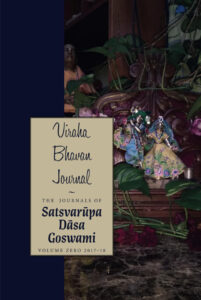
Viraha Bhavan Journal (2017–2018) was written by Satsvarūpa Mahārāja following a brief hiatus in writing activity, and was originally intended to be volume 1 in a series of published journals. However, following its completion and publication, Mahārāja again stopped writing books, subsequently focusing only on what became his current online journal, which began in August of 2018.
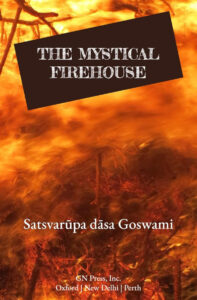
At first, I took it hard that I would have to live surrounded by the firemen, and without my own solitude. After all, for decades I had lived in my own house with my own books and my own friends. I was also now a crippled person who couldn’t walk, living among men who did active duties. But when Baladeva explained it to me, how it was not so bad living continually with other firemen and living in the firehouse with its limited facilities, I came to partially accept it and to accept the other men. I came to accept my new situation. I would live continually in the firehouse and mostly not go outside. I would not lead such a solitary life but associate with the other firemen.
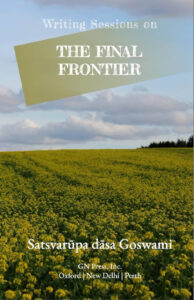
Let me write sweet prose.
Let me write not for my own benefit
but for the pleasure of Their Lordships.
Let me please Kṛṣṇa,
that’s my only wish.
May Kṛṣṇa be pleased with me,
that’s my only hope and desire.
May Kṛṣṇa give me His blessings:
Kṛṣṇa Kṛṣṇa Kṛṣṇa Kṛṣṇa Kṛṣṇa he
Rāma Rāghava Rāma Rāghava
Rāma Rāghava rakṣa mām.
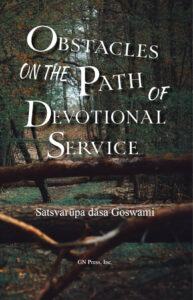
You mentioned that your pathway has become filled with stumbling blocks, but there are no stumbling blocks. I can kick out all those stumbling blocks immediately, provided you accept my guidance. With one stroke of my kick, I can kick out all stumbling blocks. —Letter by Śrīla Prabhupāda, December 9, 1972.
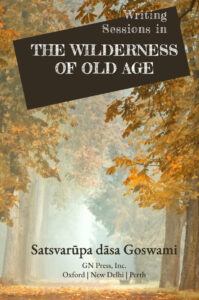
The Writing Sessions are my heart and soul. I’m trying my best to keep up with them. I am working with a few devotees, and they are far ahead of me. I wander in the wilderness of old age. I make my Writing Sessions as best I can. Every day I try to come up with a new subject. Today I am thinking of my parents. But I don’t think of them deeply. They are long gone from my life. Śrīla Prabhupāda wrote a poem when he was a sannyāsī, and he said now all my friends and relatives are gone. They are just a list of names now. I am like that too. I am a sannyāsī with a few friends. I love the books of Śrīla Prabhupāda. I try to keep up with them. I read as much as I can and then listen to his bhajanas.
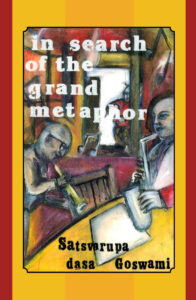
The metaphor is song. Explain it. Yes, particulars may not seem interesting or profound to readers who want structured books.
Wait a minute. Don’t pander to readers or concepts of Art. But Kṛṣṇa conscious criteria are important and must be followed. So, if your little splayed-out life-thoughts are all Kṛṣṇa conscious, then it’s no problem.
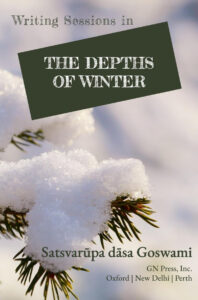
I am near the end of my days. But I do like the company of like-minded souls, especially those who are Kṛṣṇa conscious. Yes! I am prone to Kṛṣṇa consciousness. I have been a disciple of Bhaktivedanta Swami Prabhupāda for maybe almost sixty years. Sometimes I fail him. But I always bounce back and fall at his feet. It is a terrible thing that I sometimes do not have the highest love for him. It is a terrible thing. Actually, however, I never fall away from him. He always comes and catches me and brings me back to his loving arms.

This edition of Satsvarūpa dāsa Goswami’s 1996 timed book, Upstate: Room to Write, is published as part of a legacy project to restore Satsvarūpa Mahārāja’s writings to ‘in print’ status and make them globally available for current and future readers.
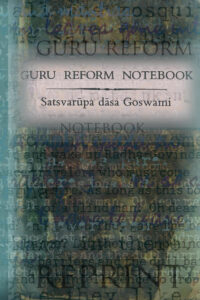
A factual record of the reform and change in ISKCON guru system of mid ’80s.
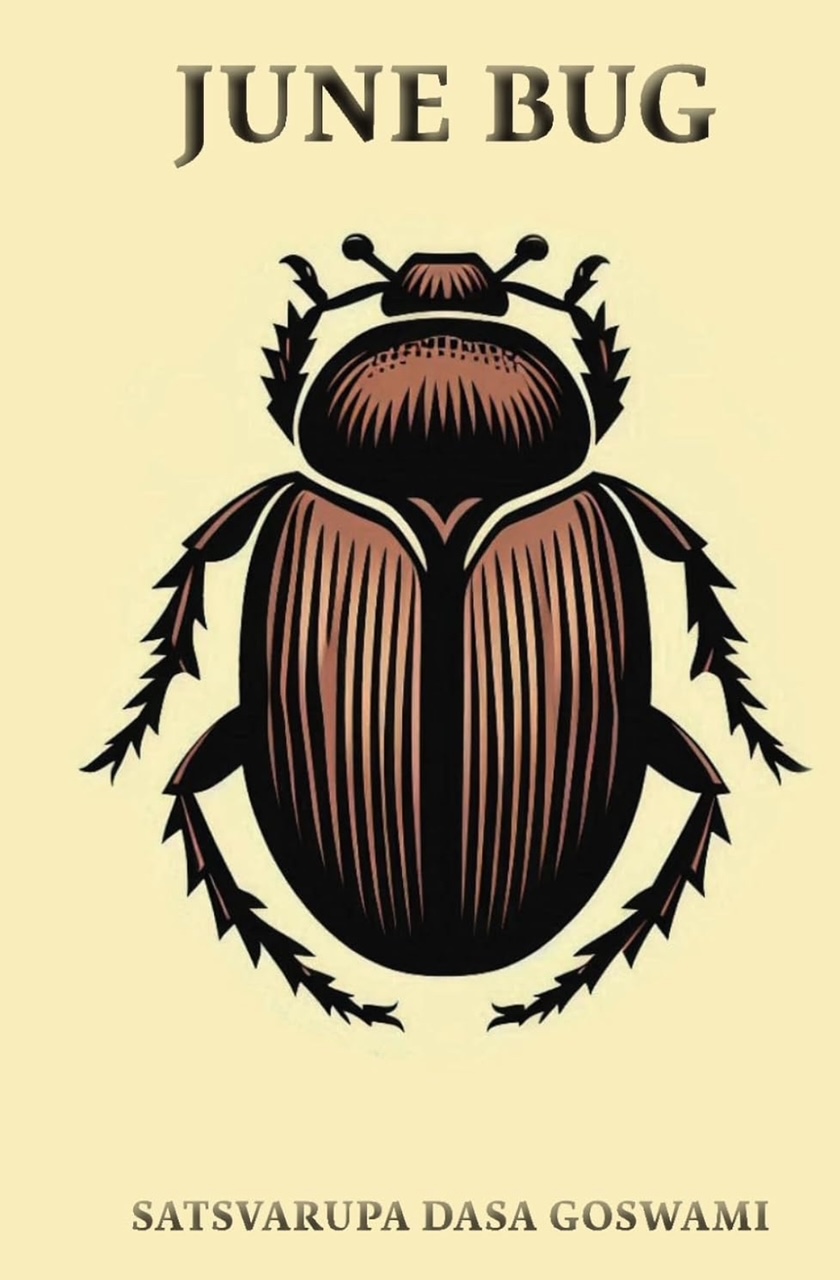
Readers will find, in the Appendix of this book, scans of a cover letter written by Satsvarūpa Mahārāja to the GN Press typist at the time, along with some of the original handwritten pages of June Bug. Together, these help to illustrate the process used by Mahārāja when writing his books during this period. These were timed books, in the sense that a distinct time period was allotted for the writing, during SDG’s travels as a visiting sannyāsī
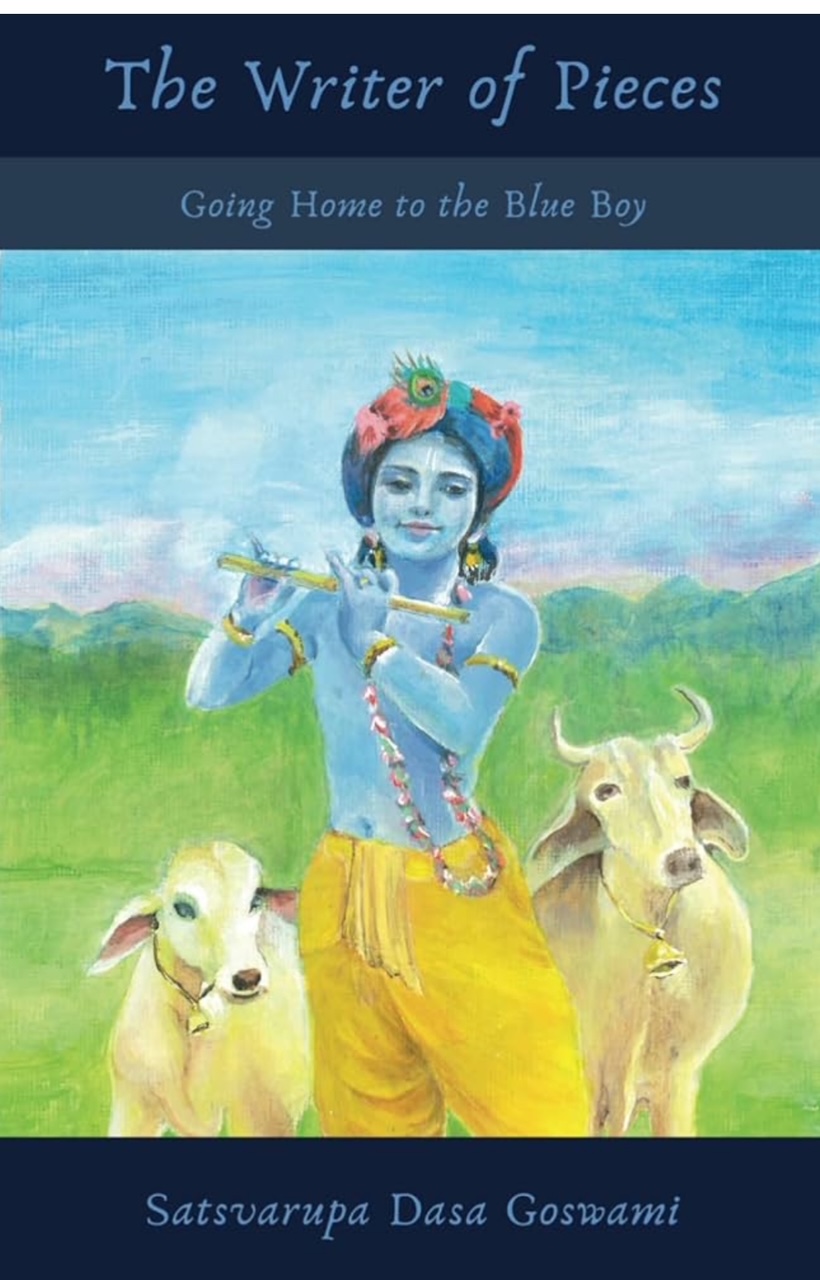
Don’t take my pieces away from me. I need them dearly. My pieces are my prayers to Kṛṣṇa. He wants me to have them, this is my way to love Him. Never take my pieces away.
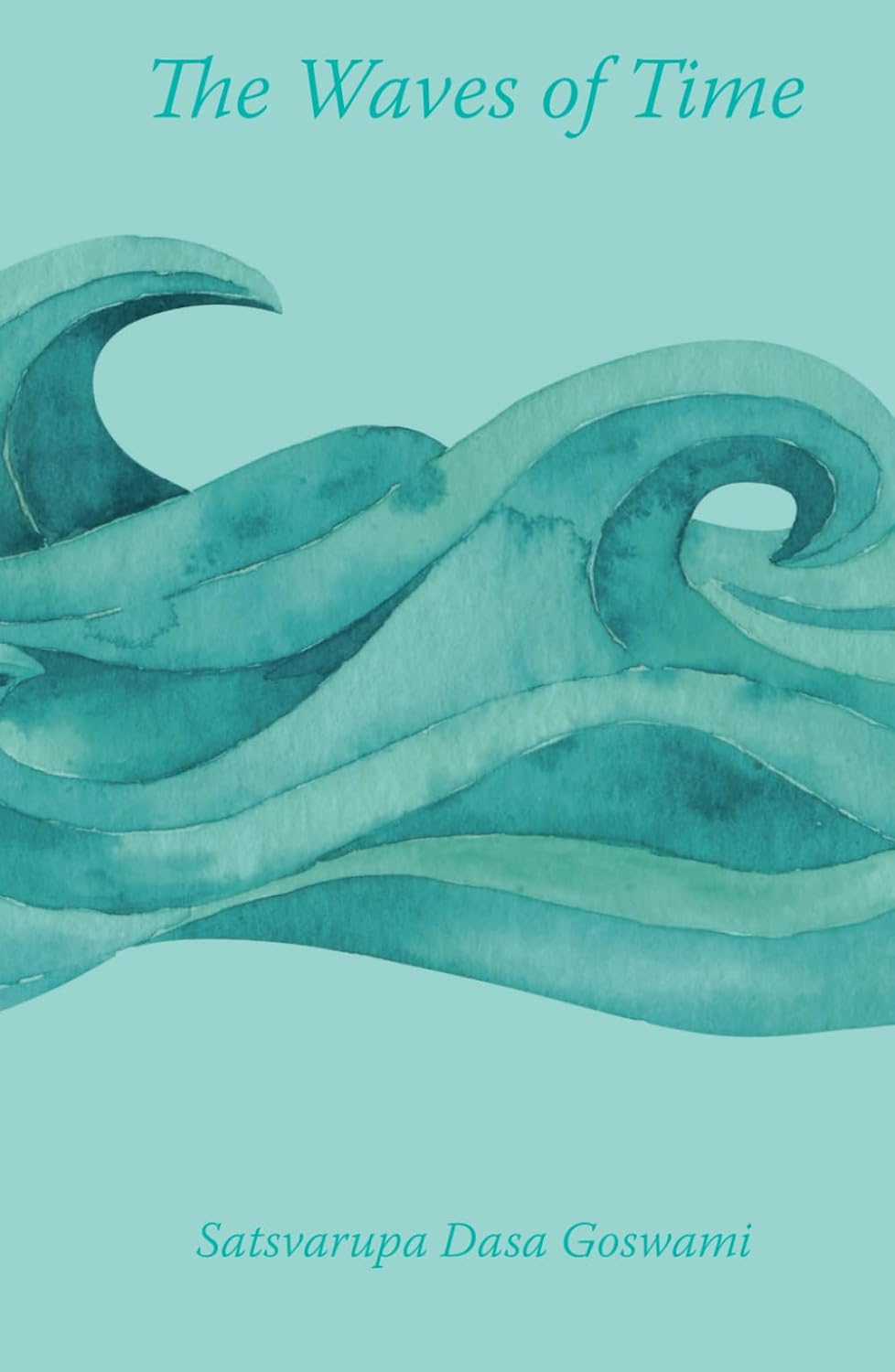
Many planks and sticks, unable to stay together, are carried away by the force of a river’s waves. Similarly, although we are intimately related with friends and family members, we are unable to stay together because of our varied past deeds and the waves of time.

To Śrīla Prabhupāda, who encouraged his devotees (including me) To write articles and books about Kṛṣṇa Consciousness.
I wrote him personally and asked if it was alright for his disciples to write books, Since he, our spiritual master, was already doing that. He wrote back and said that it was certainly alright For us to produce books.

I have a personal story to tell. It is a about a time (January–July 1974) I spent as a personal servant and secretary of my spiritual master, His Divine Grace A.C. Bhaktivedanta Swami Prabhupäda, founder-äcärya of the International Society for Krishna Consciousness. Although I have written extensively about Çréla Prabhupäda, I’ve hesitated to give this account, for fear it would expose me as a poor disciple. But now I’m going ahead, confident that the truth will purify both my readers and myself.

First published by The Gītā-nāgarī Press/GN Press in serialized form in the magazine Among Friends between 1996 and 2001, Best Use of a Bad Bargain is collected here for the first time in this new edition. This volume also contains essays written by Satsvarūpa dāsa Goswami for the occasional periodical, Hope This Meets You in Good Health, between 1994 and 2002, published by the ISKCON Health and Welfare Ministry.

This book has two purposes: to arouse our transcendental feelings of separation from a great personality, Śrīla Prabhupāda, and to encourage all sincere seekers of the Absolute Truth to go forward like an army under the banner of His Divine Grace A.C. Bhaktivedanta Swami Prabhupāda and the Kṛṣṇa consciousness movement.

A single volume collection of the Nimai novels.

Śrīla Prabhupāda was in the disciplic succession from the Brahmā-Mādhva-Gauḍīya sampradāya, the Vaiṣṇavas who advocate pure devotion to God and who understand Kṛṣṇa as the Supreme Personality of Godhead. He always described himself as simply a messenger who carried the paramparā teachings of his spiritual master and Lord Kṛṣṇa.

Dear Srila Prabhupada,
Please accept this or it’s worse than useless.
You have given me spiritual life
and so my time is yours.
You want me to be happy in Krishna consciousness
You want me to spread Krishna consciousness,

This collection of Satsvarūpa dāsa Goswami’s writings is comprised of essays that were originally published in Back to Godhead magazine between 1966 and 1978, and compiled in 1979 by Gita Nagari Press as the volume A Handbook for Kṛṣṇa Consciousness.

This second volume of Satsvarūpa dāsa Goswami’s Back to Godhead essays encompasses the last 11 years of his 20-year tenure as Editor-in-Chief of Back to Godhead magazine. The essays in this book consist mostly of SDG’s ‘Notes from the Editor’ column, which was typically featured towards the end of each issue starting in 1978 and running until Mahārāja retired from his duties as editor in 1989.

This collection of Satsvarupa dasa Goswami’s writings is comprised of essays that were originally published in Back to Godhead magazine between 1991 and 2002, picking up where Volume 2 leaves off. The volume is supplemented by essays about devotional service from issues of Satsvarupa dasa Goswami’s magazine, Among Friends, published in the 1990s.

“This is a different kind of book, written in my old age, observing Kṛṣṇa consciousness and assessing myself. I believe it fits under the category of ‘Literature in pursuance of the Vedic version.’ It is autobiography, from a Western-raised man, who has been transformed into a devotee of Kṛṣṇa by Śrīla Prabhupāda.”
 The Best I Could Do
The Best I Could DoI want to study this evolution of my art, my writing. I want to see what changed from the book In Search of the Grand Metaphor to the next book, The Last Days of the Year.
 a Hare Krishna Man
a Hare Krishna ManIt’s world enlightenment day
And devotees are giving out books
By milk of kindness, read one page
And your life can become perfect.
 Calling Out to Srila Prabhupada: Poems and Prayers
Calling Out to Srila Prabhupada: Poems and PrayersO Prabhupāda, whose purports are wonderfully clear, having been gathered from what was taught by the previous ācāryas and made all new; O Prabhupāda, who is always sober to expose the material illusion and blissful in knowledge of Kṛṣṇa, may we carefully read your Bhaktivedanta purports.

I use free-writing in my devotional service as part of my sādhana. It is a way for me to enter those realms of myself where only honesty matters; free-writing enables me to reach deeper levels of realization by my repeated attempt to “tell the truth quickly.” Free-writing takes me past polished prose. It takes me past literary effect. It takes me past the need to present something and allows me to just get down and say it. From the viewpoint of a writer, this dropping of all pretense is desirable.
 Geaglum Free Write
Geaglum Free WriteThis edition of Satsvarūpa dāsa Goswami’s 1996 timed book, Geaglum Free Write Diary, is published as part of a legacy project to restore Satsvarūpa Mahārāja’s writings to ‘in print’ status and make them globally available for current and future readers.